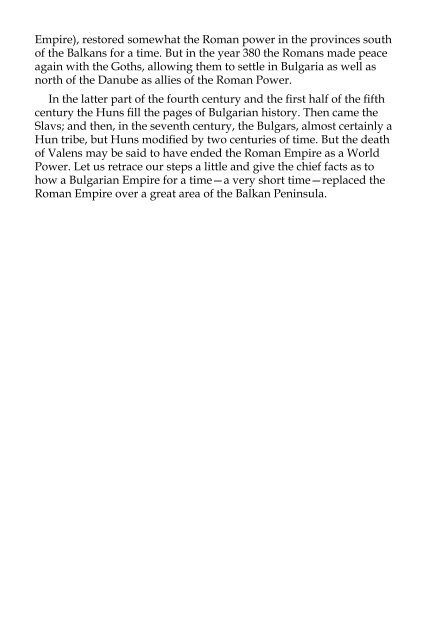Bulgaria e-book - iMedia
Bulgaria e-book - iMedia
Bulgaria e-book - iMedia
Create successful ePaper yourself
Turn your PDF publications into a flip-book with our unique Google optimized e-Paper software.
Empire), restored somewhat the Roman power in the provinces south<br />
of the Balkans for a time. But in the year 380 the Romans made peace<br />
again with the Goths, allowing them to settle in <strong>Bulgaria</strong> as well as<br />
north of the Danube as allies of the Roman Power.<br />
In the latter part of the fourth century and the first half of the fifth<br />
century the Huns fill the pages of <strong>Bulgaria</strong>n history. Then came the<br />
Slavs; and then, in the seventh century, the Bulgars, almost certainly a<br />
Hun tribe, but Huns modified by two centuries of time. But the death<br />
of Valens may be said to have ended the Roman Empire as a World<br />
Power. Let us retrace our steps a little and give the chief facts as to<br />
how a <strong>Bulgaria</strong>n Empire for a time—a very short time—replaced the<br />
Roman Empire over a great area of the Balkan Peninsula.<br />
Chapter III<br />
The Scrap-Heap of Races<br />
The historian, rightly, must always march under a banner inscribed<br />
“Why?” The facts of history bring no real informing to the human<br />
mind unless they can be traced to their causes, and thus a chain of<br />
events followed link by link to see why some happening was so<br />
fruitful in results, and to search for the relation of apparently isolated<br />
and accidental incidents.<br />
The Balkan Peninsula has to-day just emerged from a most bloody<br />
war. It prepares for another to break out as soon as the exhaustion<br />
of the moment has passed. Since ever the pages of history were<br />
inscribed it has been vexed by savage wars. Why?<br />
There is an explanation near at hand and clear. In the Balkans there<br />
is a geographical area, which could house one nation comfortably,<br />
and is occupied by the scraps of half a dozen nations.<br />
(1) There are the remnants of the Turks who at one time threatened<br />
the conquest of all Europe. Back from the walls of Vienna they have<br />
been driven little by little until now they occupy the toe only of the<br />
Balkan Peninsula. But the days have not far departed when they held<br />
almost all the Peninsula, and the present smallness of their portion<br />
dates back only from 1913.<br />
(2) There are the Greeks, heirs of the traditions of Philip and<br />
Alexander, and of the old Roman Empire. For centuries their national<br />
but not their racial existence was dormant under the heel of the Turk.<br />
Greek independence was restored recently, and since the war of 1912-<br />
1913 has established itself vigorously.<br />
(3) There are the Roumanians, descendants of the old Roman<br />
colony of Trajan in Dacia.<br />
(4) There are the Bulgars, originally a Tartar people coming from<br />
the banks of the Volga, who entered <strong>Bulgaria</strong> in the seventh century<br />
as the Normans entered England at a later date, and who mingled<br />
with a Slav race they found there—at first as conquerors, afterwards<br />
becoming the absorbed race.<br />
(5) There are the Serbs, somewhat akin to the Bulgars, whose<br />
original home seems to have been that of the Don Cossacks, who also<br />
came into the Peninsula in the seventh century. They are of purer





